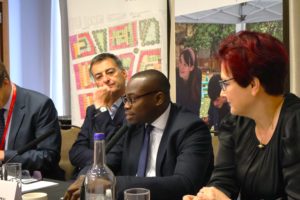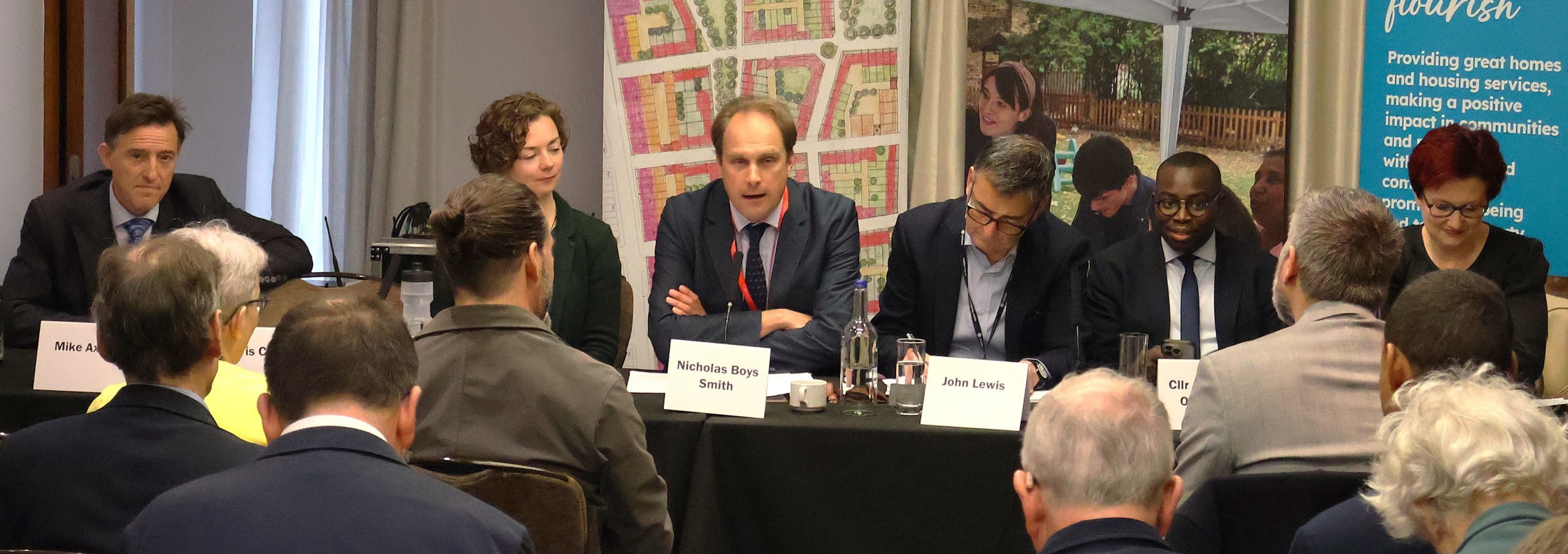Report from our event at Labour Conference: New Towns. Old Challenges. How do we create new places which are popular and durable, viable and fair?
‘Be it enacted by the King’s most Excellent Majesty, by and with the advice and consent of the Lords Spiritual and Temporal, and Commons, in this present Parliament assembled, and by the authority of the same, as follows: If the Minister is satisfied, after consultation with any local authorities who appear to him to be concerned, that it is expedient in the national interest that any area of land should be developed as a new town by a corporation established under this Act, he may make an order designating that area as the site of the proposed new town.’ New Towns New Towns Act 1946, 1 August 1946
History does not repeat but it does rhyme. As the government is very aware, indeed they have explicitly referenced the point, new towns were a core part of the post-war house-building programme. At Labour conference in September 2024 an expert, wide-ranging and helpfully complementary panel gathered to discuss how to create these ‘new’ new towns:
Mike Axon of SLR who kindly sponsored the event; Chris Curtis, newly elected MP for part of arguably the most economically successful new town, Milton Keynes North; cycling author and campaigner, Laura Laker; John Lewis, Executive Director at Peabody with previous experience in both Letchworth Garden City and Milton Keynes; Cllr Anthony Okereke, leader of Greenwich Council; and Mary Parsons, Regeneration and Partnerships Director of Lovell Partnerships and my former colleague on the Building Better Building Beautiful Commission.
Amongst the questions we considered were:
-
- Where should new towns go? Should they be urban extension, stand alone or infill of large cities?
-
- How big should new towns be? The new towns taskforce terms of reference suggests a minimum size of 10,000 homes. Is this enough?
-
- What should new towns be? Who should design them? How dense should they be? How should we move about them? Should they be towns in the old fashioned sense or suburbs by another name?
-
- What is the role of master developers versus housebuilders versus Housing Associations versus SMEs versus self-builders?
-
- What influence will there be from the important proposed changes to transport planning which make it easer to plan for non car-dominated places? (The proposed edits to paragraphs 114 and 115 of the National Planning Policy Framework if you are a sucker for detail).
-
- How long will it take? When will the first new town create a home that someone can live in?
-
- Can new towns be beautiful? Should they be? Or will they be what the market will provide?
-
- What would your key advice on this be to the New Towns Board and to the Government? Or to local councils wishing to engage with the process?


The conversation was rich and varied. I think we largely agreed though there were important differences of focus, as you would expert from a panel so diverse in experience. If I was to attempt to summarise our conversation into one phrase it would be this: if we wish to create new towns which flourish we need to be town-builders not housebuilders. They are not the same thing. A few of the key points which emerged form our conversation hopefully explain why.
-
- Make it easy to move about. 75 – 80 per cent of trips are within settlements. If we can create places in which it is natural, safe, enjoyable and easy not to need to jump into a car for all of these we will create healthier and happier places on less land. Gentle density not sprawl. This will require important steps such as refusing to (mis!)use out of town DMRB highways guidance and using Manuel for Streets guidance instead.
-
- Create a hub and hook. The most successful new towns post war (and many did not flourish) were in the right place and they were large enough to be a hub in and of themselves. You could get to them and they were worth getting to.
-
- Geography matters. New towns need to be in places of high demand. All or very nearly all should be in the south and particularly the south east. Urban extensions will normally be easier to ‘get going’ than entirely new settlements.
-
- Stewardship matters. The real challenge is the long term not the short term. An endowment fund, paid for from value uplift will be necessary to maintain public and civic infrastructure. We know how to do this.
-
- Variety is crucial not just of buildings but of use and pattern. Good places mingle homes and shops and offices and schools. They are also more resilient over time. Don’t zone!
-
- History helps. Don’t be afraid to plagiarise. Lots worked from the post-war new towns. Lots did not. Don’t be afraid to copy. Do be afraid of not studying and understanding what went well and badly last time.
-
- Partnerships beyond the red line. Easy to say, hard to do but successful new towns will require superlative partnership work, particularly on issues such as transport, beyond the new town’s red line.
-
- Councils should have the courage and confidence to set a vision for a beautiful and happy places. Don’t outsource it to individual firms. The council needs to really care about the future and really care about what people like, find attractive and where they feel at home. The council needs to own the vision but it must reflect reality.
-
- Development corporations will often be the right answer but can they have control over transport as well as planning? They will need to.
-
- Is youth the answer? Apparently, nearly all the architects who worked on Milton Keynes were under 40. Is this wise or foolish? Does it engender a confidence to strive into the future or a risk of repeating the errors of the past?
-
- This won’t be cheap. The infrastructure requirements and the need to get shops and schools working before a town has critical mass will not be cheap. Councils and corporations employed thousands and spent hundreds of millions 60 years ago when building the last generation of new towns. Wherever possible this heightens the need to ‘hook on’ to existing infrastructure and to create empowering frameworks that allow many hands for many tenures to create a new town.
Apologies for the important points doubtless missed out from this list! I was not able to capture everything in my notes and many of the words above are my attempt at a synthesis not those of our esteemed panellists. And, of course, not everyone on the panel necessarily agrees with all those points or would put them in quite that way.
You can watch a video of the full conversation without my attempted synthesis here and below
Nicholas Boys Smith
Chair, Create Streets


